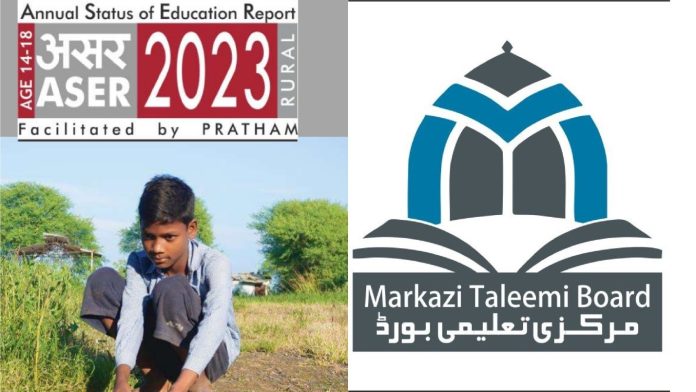New Delhi, Feb. 11: Markazi Taleemi Board (MTB) convened a webinar titled “ASER 2022-23 Understanding Education Realities” on Friday, aimed at delving into the recently published report “Annual Status of Education Report (Rural) 2023: Beyond Basic” and its implications. The much debated ASER 23 report since its release by the Pratham Foundation on January 17th was scrutinized in detail during the virtual event. The ASER 2023 “Beyond Basics” survey encompassed 28 districts across 26 states, engaging a total of 34,745 adolescents aged 14-18 years. It sought answers to pivotal questions regarding the current activities of India’s youth, their proficiency in basic and applied reading and math, digital literacy, smartphone accessibility, and usage patterns.
Diverse stakeholders from the educational sector, including practitioners, scholars, and academicians participated in MTB’s webinar. Notable among them were Sadat Hussain, PhD in Educational Studies from JNU; and Musab Qazi, a journalist, who shared their insights on the ASER 2023 report. During his presentation, Mr. Hussain voiced apprehensions regarding the quality of rural school education. He traced the evolution of ASER since its inception in 2005, elucidating the methodologies employed in its reports. Furthermore, he provided an in-depth analysis of the survey and research design of ASER 2023 “Beyond Basics,” lamenting the limited grasp of essential concepts such as rural society and learning theories.
Mr. Qazi delved into the report’s key findings concerning activity levels, literacy, digital awareness, and aspirations of rural adolescents aged 14-18. Contrasting these findings with those from ASER 2017, he highlighted disparities in arithmetic and English language proficiency between rural males and females, emphasizing the former’s superior performance in applying these skills to real-life situations.
Concluding the webinar, Syed Tanveer Ahmed, Secretary of MTB underscored the necessity of contextualizing the report within the framework of Muslim education. He stressed the urgency of devising solutions to address the prevailing learning deficits at the school level among the students. The webinar served as a platform for critical discourse and reflection on the state of rural education in India, urging concerted efforts towards meaningful interventions and reforms to ensure quality educational opportunities for all.




